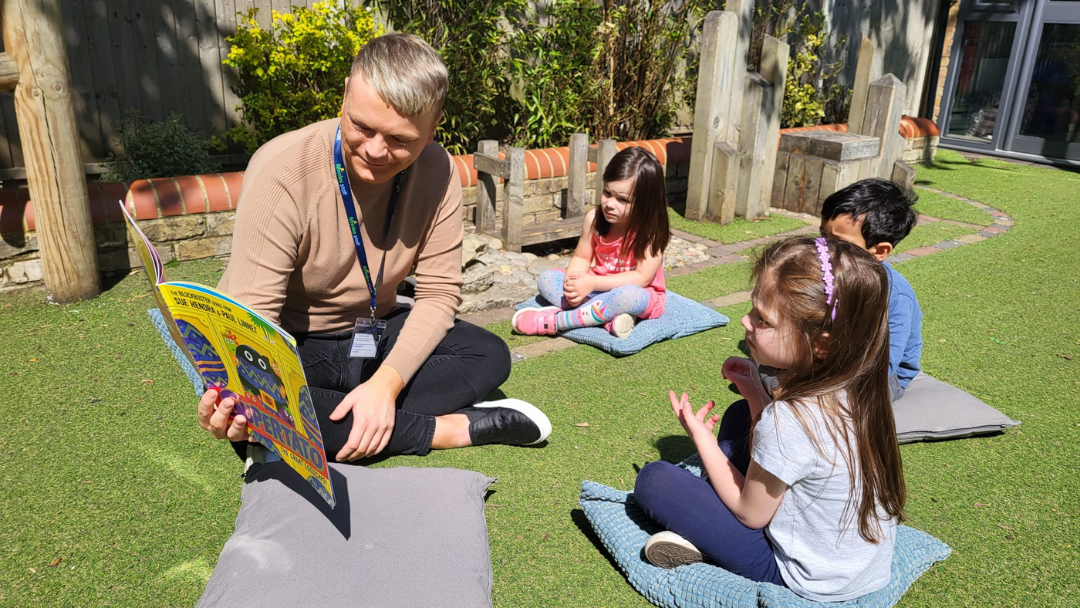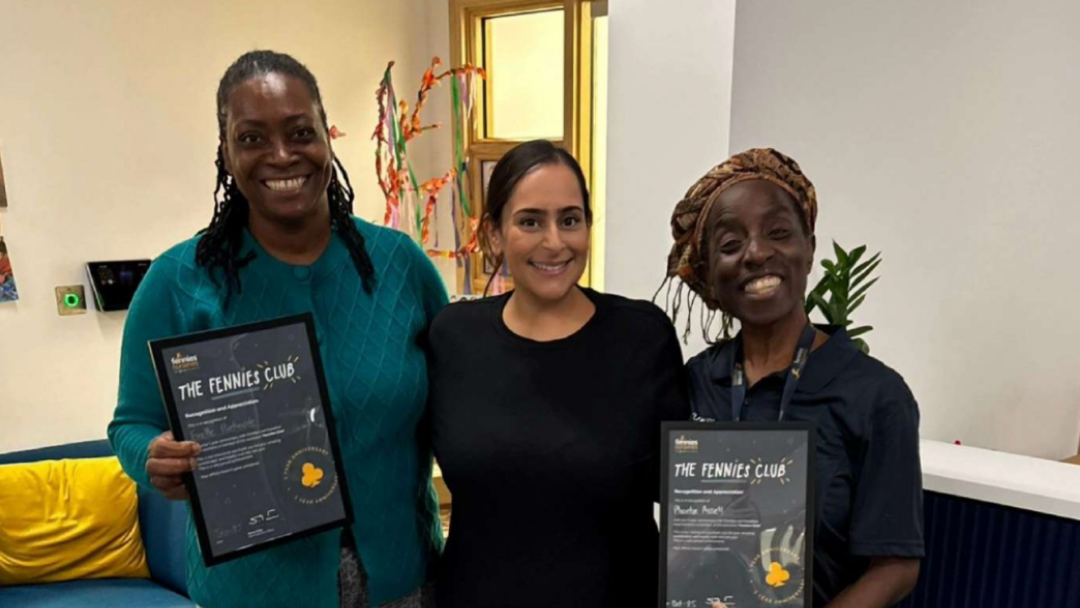Early Years education is a fundamental stage in a child's development, shaping their learning experiences, social skills and emotional well-being. However, the sector remains female-led, with male educators making up only a small percentage of the workforce.
At Fennies, we believe in creating an inclusive and empowering workplace for everyone, regardless of gender, background or experience. Our Peoples Promise ensures that every team member feels respected and encouraged to bring their whole self to work. We are committed to fostering a culture of belonging and inclusivity, where diverse perspectives and experiences help shape the future of Early Years education.
Our Fennies DNA is built on the belief that diversity strengthens our nurseries, benefiting both our teams and the children in our care. Through this culture, we create a rich, dynamic learning environment where every educator plays a vital role in shaping young minds. Whether it's career progression opportunities, tailored training programs or a supportive workplace culture, we ensure that all our team members feel equally valued and heard.
Having male educators in nurseries brings valuable benefits, not only providing children with diverse role models but also challenging traditional gender stereotypes. Their presence helps create a well-rounded environment, showing children that care, education and leadership is for everyone.
In this blog, we hear from six males within the sector, touching on topics such as:
- What Inspired You To Work In Early Years?
- Why Do You Think Male Educators Are Important in Early Years Settings?
- What Impact Do Male Role Models Have On Young Children’s Development?
- Do You Believe There Are Any Barriers That Exist For Men To Enter The Early Years Industry?
- How Can We Encourage More Men To Pursue A Career In Early Years Education?
- Do You Feel That Being A Male Educator Gives You A Unique Opportunity To Influence Children In Certain Ways?
What Inspired You To Work in Early Years?

Each educator’s journey into Early Years is unique. For some, it was a lifelong passion, while for others, it was an unexpected career path that became a calling. Here’s what inspired them to work with young children.
Viktor - Deputy Manager, Fennies Kidbrooke, Whittle Road
"My mum was a Deputy Manager at a nursery. She often pushed me to do an apprenticeship at her nursery, for a while I did ignore it I will admit. But after working in sales I soon realised working behind a desk and having the same routine everyday wasn’t for me. I started off with an apprenticeship and got my Level 3 qualifications and I’ve never looked back since."
Jake - Nursery Manager, Fennies Bromley, London Lane
"Growing up, my mum worked with children, and I was lucky enough to attend her nursery. I still vividly remember the love and care she showed to every child, creating a nurturing environment that felt like a second home. It inspired me deeply, and I knew I wanted to build those kinds of meaningful relationships too.
The world can sometimes feel like a scary place but knowing that we can make a real difference in children's lives is what drives me. I truly believe Early Years education is one of the most impactful professions. If you're looking for a role where you can see the tangible effects of your efforts every day, Early Years is absolutely the way to go!"
Rupert - Room Leader, Fennies Beckenham, Mosaic Way
"I first worked in a primary school, where in particular I helped run an after school club. Normally I would be teaching Year 5 students, through this after school club, I got exposure to working with younger children and had an amazing time. I loved how intrigued and curious they were, being able to impart my knowledge onto them and inspire children to learn about the world around them truly resonated with me."
Jamie - Head of People, Fennies Nurseries
"My journey into Early Years education was shaped by experiences from a young age. Starting part-time jobs at 15 or 16, I found myself naturally drawn to roles that involved working with children, whether it was hosting birthday parties or assisting at sports clubs. This early exposure sparked my interest in education, and with encouragement from my family, I pursued a career in teaching, dedicating ten years to the profession.
One of my key strengths is being a developer, as highlighted by my CliftonStrengths profile. I find immense joy in witnessing growth, not just in children, but in people overall. This passion for development led me to Early Years when a friend, already working in the sector, recommended that I explore becoming a trainer. That suggestion was transformative. It opened my eyes to how underappreciated Early Years development is in the UK compared to other parts of Europe. I realised there was a significant gap in knowledge and recognition of the importance of Early Years education here, which fueled my desire to contribute meaningfully to this field."
Martin - Room Leader, Fennies Croydon, Addiscombe Road
"I came from a big family so I was always surrounded by children from a young age. From here it was clear for me to see that I wanted to make a difference in young children’s lives, so the Early Years sector was the natural progression for me to be able to make a positive lasting impact."
Claudio - Head of Diversity and Inclusion at Male Childcare & Teaching Jobs
"I initially fell into the industry by chance. I moved to London from Italy at 19 without clear career prospects, and a friend's flatmate, who worked as a male room leader in a nursery, encouraged me to apply. I took a leap and became an apprentice, and what started as a way to find a job soon turned into a passion. I loved the work, felt connected to the children's growth, and after becoming qualified, I was promoted to a room leader role. It’s been a rewarding journey ever since."
Why Do You Think Male Educators Are Important in Early Years Settings?

A well-balanced Early Years environment benefits from a diverse team of educators. Male educators bring different perspectives, interaction styles and learning approaches that can enrich children’s experiences. Their presence helps create a setting that reflects the real world, where children grow up seeing both men and women as role models and educators. Here’s what our interviewees had to say about why male educators play a crucial role in Early Years settings.
Viktor - Deputy Manager, Fennies Kidbrooke, Whittle Road
"As male educators, we bring a completely different perspective than female educators often do. By having a mixture of educators, it gives the children a more rounded experience of what the world will be like when they’re older. Some children may not have a male role model in their life to look up to, so having that figure they can mimic the behaviour of, will often help the children navigate and nurture through their Early Years."
Jake - Nursery Manager, Fennies Bromley, London Lane
"Male educators bring an important balance to the Early Years workforce, offering unique perspectives and approaches that enrich the learning environment. Having both male and female role models can be incredibly beneficial for children, providing them with consistency, diversity and a broader range of relationships to learn from."
Rupert - Room Leader, Fennies Beckenham, Mosaic Way
"When you're in Early Years, a sign of a great nursery is making it feel like a home away from home. Since not all children inconclusively have both male and female role models at home, having a diverse mix of educators in nursery helps them engage with different viewpoints and experiences. It’s not about reinforcing gender roles but about fostering an inclusive and enriching learning environment where children benefit from a variety of influences. If the nursery setting is predominantly female, then children will become normalised to this, when in reality, the world is far different."
Jamie - Head of People, Fennies Nurseries
"I’ve often been told, “It’s great to have a male in this role,” but I didn’t want to be seen as a token. I just wanted to be recognised for being good at what I do. That said, I’ve come to see the value male educators bring. Children respond differently to varied tones, voices and interaction styles, which supports their social development. Not all children have both male and female role models at home, so having that balance in nursery helps them experience different perspectives. It’s not about gender stereotypes, it’s about diversity enriching the learning environment."
Martin - Room Leader, Fennies Croydon, Addiscombe Road
"Everyone can do the job if they are committed to it, regardless of who you are! It is important to show that males can work in the sector and show the nurturing side of themselves, that tends to be previewed as a characteristic that is predominantly held by females. Some children may not have a male role model in their life so being able to experience it within the nursery setting so they grow up with it from the very start can be very beneficial for them."
Claudio - Head of Diversity and Inclusion at Male Childcare & Teaching Jobs
"Male educators bring valuable diversity to the Early Years workforce. They challenge traditional gender roles and offer children different perspectives. In settings where children are exposed to both male and female role models, they learn that both genders are equally capable of fulfilling nurturing, leadership and educational roles. This kind of representation is vital in promoting gender equality and creating a more inclusive environment for everyone."
What Impact Do Male Role Models Have on Young Children’s Development?
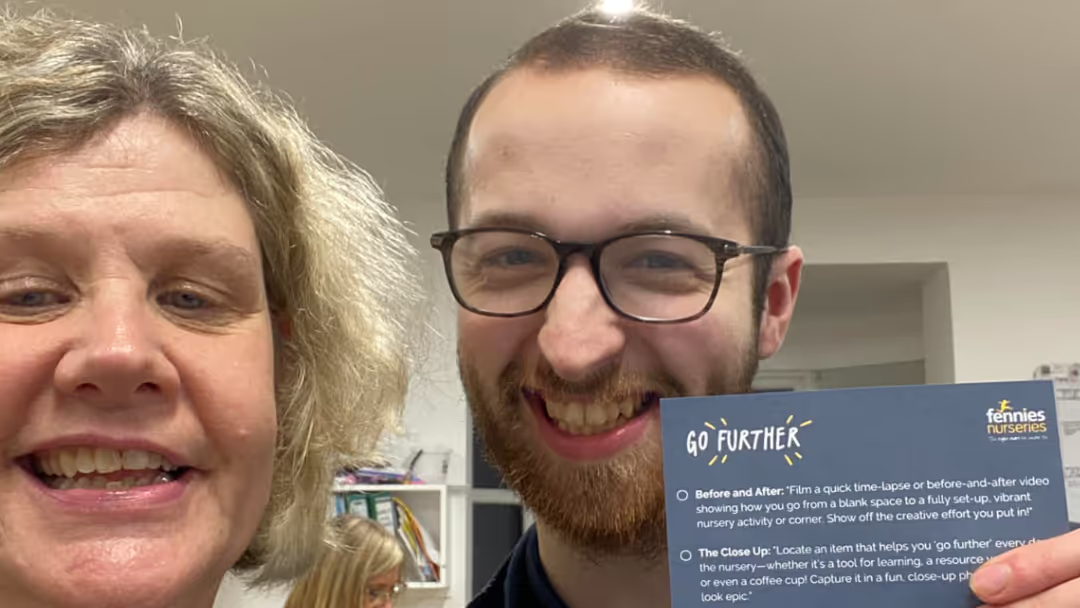
Male role models in Early Years settings provide children with diverse experiences that help shape their social, emotional and cognitive growth. Their presence helps challenge stereotypes, encourage balanced development and can offer a different perspective on learning and behaviour.
Viktor - Deputy Manager, Fennies Kidbrooke, Whittle Road
"Male role models can have a huge impact on children’s behavioural development, especially for some of the boys. Typically, boys are more likely to act in a manner where they are always very energetic, this is obviously not exclusive to boys but it’s seen more regularly. By having that male role model, it can help high energy children regulate their behaviour better as they can model their behaviour off the educators who they see every day. If boys see male educators acting in a calm manner, they are more likely to replicate that type of behaviour."
Jake - Nursery Manager, Fennies Bromley, London Lane
"Male educators play an essential role in creating balance within Early Years settings, offering consistency and demonstrating that care and nurturing are not tied to gender. Their presence helps break down barriers, foster inclusion and show children that everyone has a role to play in shaping their future."
Rupert - Room Leader, Fennies Beckenham, Mosaic Way
"Men and women have different behaviours, interactions and approaches when it comes to Early Years education. Even though both follow company policy, and that they differ from person to person, having interactions with a variety of educators helps with children’s holistic development. Often boys will react well to male role models and similar with girls to female role models, so having a range within the nursery setting is vital. Also, males tend to be more encouragement-focused when it comes to their approach, with a more common mindset being ‘you’ll be okay’ and females tend to provide more nurturing behaviour. The pivotal point to this is finding a balance between these approaches and tailoring your interactions depending on the unique needs of the child."
Jamie - Head of People, Fennies Nurseries
"Male role models in Early Years help normalise the idea that being caring and nurturing is for everyone. When boys see men in these roles, it shows them it’s okay to be kind, nurturing and looked after by both males and females. The more we see this, the more it becomes normalised, breaking down stereotypes. It also teaches children about representation, that people from all walks of life can do all kinds of things, helping them grow up with more open-minded views about gender roles."
Martin - Room Leader, Fennies Croydon, Addiscombe Road
"Males can deliver high levels of education just like anyone else, helping push the children to achieve their best. They can have a different perspective and outlook when it comes to setting up activities that can help the children develop new awarenesses and skills. Being able to shape young minds in this way is beyond rewarding."
Claudio - Head of Diversity and Inclusion at Male Childcare & Teaching Jobs
"Male role models have a significant impact on children’s social and emotional development. They offer a different approach to problem-solving and often encourage creativity, risk-taking and resilience. For boys, especially male educators, serve as important figures who demonstrate that being nurturing and caring are just as crucial as being assertive or competitive. For girls, they provide a broader understanding of gender diversity and equality, which helps to break down stereotypes from an early age."
Do You Believe There Are Any Barriers That Exist for Men to Enter the Early Years Industry?
Despite growing awareness, there are still challenges preventing more men from entering the Early Years workforce. Societal perceptions, lack of representation and gender stereotypes can all contribute to creating these barriers.
Viktor - Deputy Manager, Fennies Kidbrooke, Whittle Road
"I don’t believe there are necessarily barriers, it’s more a lack of knowledge that being an Early Years educator is something that men can consider as a career path. Men don’t always see it as an option, so it’s not often on their radar. Therefore, providing more details on the job description to provide men with a greater understanding of what the profession actually includes could prove beneficial."
Jake - Nursery Manager, Fennies Bromley, London Lane
"There are undoubtedly barriers to entry for men wanting to work in Early Years education, and I believe this is an issue that isn’t discussed nearly enough. Despite progress in many areas, the stigma still exists that men do not belong in Early Years, which is simply not true. This outdated belief discourages men from pursuing careers in this field and deprives children of the benefits that come from having a diverse range of role models during their formative years.
It is crucial that we challenge these stereotypes and work to make our voices heard. Raising awareness and normalising the idea of men in Early Years education is vital. Through open conversations, advocacy and the sharing of experiences, we can begin to dismantle these stigmas and encourage more men to consider this incredibly rewarding career path. By doing so, we can build a workforce that truly reflects the diversity of the world our children are growing up in."
Rupert - Room Leader, Fennies Beckenham, Mosaic Way
"Not necessarily barriers in terms of qualifications, as I’ve never felt it personally when going for roles in the sector. I’ve had great experiences when going for roles in Early Years. I think the problem rather lies in the awareness of roles in Early Years, and that they are available to men. In general, it’s not as culturally accepted in society for men to work in Early Years, it seems foreign. Whereas people associate it naturally with women as the job is seen to suit more motherly characteristics. Although being nurturing is a great characteristic to have when working in Early Years, it's not exclusive to females. As the world evolves, these stereotypes within our cultural society slowly begin to break away, making jobs of all kinds becoming more accessible for all regardless of who they are!"
Jamie - Head of People, Fennies Nurseries
"Rather than barriers, I’d say there’s challenges that males face. One challenge is the stigma and curiosity that comes with being in the minority, people tend to ask more personal questions about your life or make assumptions, which can be uncomfortable. Unlike in other roles, men in Early Years can’t just blend into the background; you’re more visible, which means you have to develop self-resilience quickly. However, children are incredibly accepting. They see you for who you are, which helps ease nerves and anxiety, especially for those who might be more introverted. The real challenge often comes from societal perceptions, not the children themselves."
Martin - Room Leader, Fennies Croydon, Addiscombe Road
"Unfortunately, some people in society may still have the old-fashioned view that working in our sector is only for females and that males don’t belong. This challenges the integrity and character of males into question which I believe is unjust, and we need to work towards fixing that over time. Hopefully if we can come together, we can change that view to one that represents more equality regardless of people's differences."
Claudio - Head of Diversity and Inclusion at Male Childcare & Teaching Jobs
"Yes, there are several barriers. Societal perceptions about gender roles in caregiving, especially in early childhood, can discourage men from pursuing careers in this field. The lack of male representation in the workforce creates a cycle, where men might not see this as a viable or accepted career choice. Additionally, there can be discomfort around men working in close contact with young children due to stereotypes and misinterpretations of their intentions. Addressing these concerns openly and promoting inclusivity within settings can help overcome these barriers."
How Can We Encourage More Men To Pursue A Career In Early Years Education?
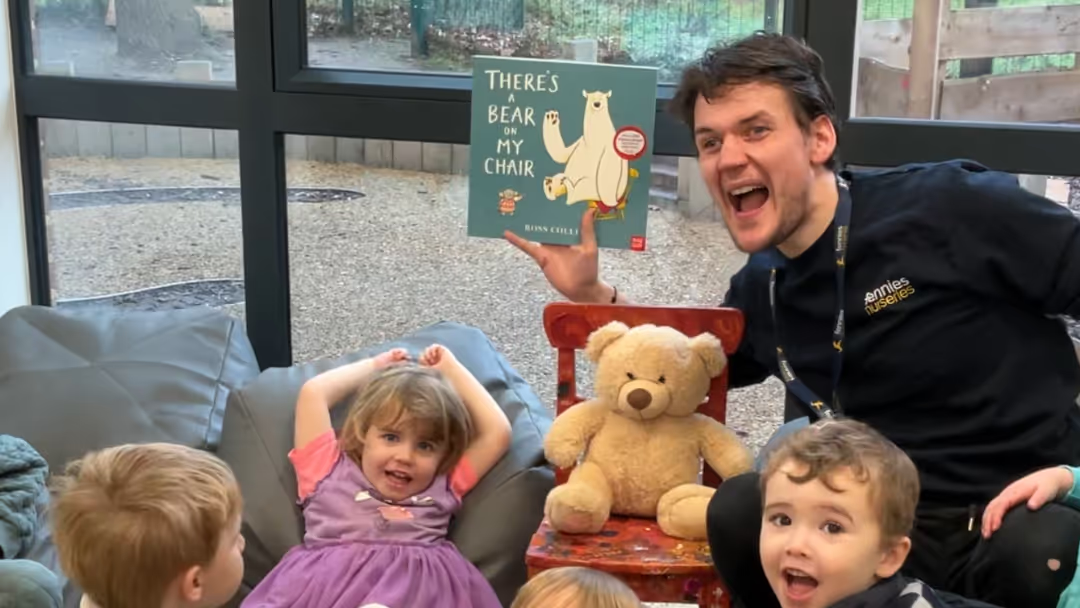
To create a more inclusive workforce, we need to break down stereotypes and actively promote Early Years education as a rewarding career path for men. Our interviewees share their thoughts on how to encourage more men to join the sector.
Viktor - Deputy Manager, Fennies Kidbrooke, Whittle Road
"Showcasing the different roles that they could take within the industry, placing more focus on the personal development side to intrigue them. It’s a fun industry to be a part of! When I started over 10 years ago, you wouldn’t see many males when it came to content being released, now you see a lot more males in media content which is amazing! As a man seeing this content, it makes it so much more relatable and you can begin to envisage yourself doing that job."
Jake - Nursery Manager, Fennies Bromley, London Lane
"My advice? Be bold. Being an educator is not just a job, it’s a calling, and it’s something to be proud of. In fact, it’s one of the coolest professions out there. Shaping young minds and helping children grow is something worth bragging about. If you want it, go for it. Don’t let stereotypes or doubts hold you back. Be proud of your passion, embrace it fully and show the world that educators make a difference every single day."
Rupert - Room Leader, Fennies Beckenham, Mosaic Way
"There’s only so much you can do to help change the culture at large. By holding open days and events, it’s a great way of spreading the word to other males in a nice and subtle manner. As males working in Early Years, we should be proud to do the work we do, meaning we naturally want to spread the word to others about how good our job is and that we would recommend it to others."
Jamie - Head of People, Fennies Nurseries
"To attract more men into Early Years, we need to showcase clear career growth opportunities, as men often seek long-term development paths. Highlighting success stories and leadership roles within the sector can make it more appealing. There’s also less stigma around men showcasing nurturing characteristics when it’s linked to fatherhood, so tapping into that and showing how those skills can translate into a rewarding career can be effective. Representation matters too; featuring male educators in events, on social media, and even linking Early Years to familiar environments like sports can help normalise the role and show it’s a career for everyone."
Martin - Room Leader, Fennies Croydon, Addiscombe Road
"By including positive action statements about men achieving well within the sector, to showcase that success stories do exist with Early Years for men. With stories like this, whether that be case studies with males in or even just images in advertisement, it will hopefully help clarify that male applicants are welcome in the sector."
Claudio - Head of Diversity and Inclusion at Male Childcare & Teaching Jobs
"Encouraging more men to pursue a career in Early Years education requires a multi-faceted approach. First, we need to challenge societal stereotypes that often suggest Early Years education is a female-dominated field. It’s important to show that male educators bring valuable skills and perspectives to the sector, which benefits both children and the wider community.
We also need to create more awareness about the positive impact male role models can have. By showcasing success stories of men who have made it in Early Years education, we can inspire others to follow in their footsteps. These stories help demonstrate that men can thrive in this career, offering practical examples for others to relate to. At Male Childcare & Teaching Jobs (MCTJ), we’re actively working to address all of these areas. For example, we create video content, webinars, and articles to showcase the success stories of male educators who’ve thrived in the sector.
Mentorship plays a huge role, too. We need to ensure that men in Early Years education feel supported at every stage of their careers. Having a relatable, same-gender mentor can make a significant difference, whether they’re just starting out or seeking guidance on progressing into leadership roles.
It's also crucial that men are given peace of mind about the settings they might join. They need to know that these nurseries or schools meet strict criteria for gender diversity, ensuring they’re entering environments that truly value inclusivity. This means offering high-quality CPD training to staff and encouraging parents to be more accepting and understanding of male educators.
In addition, we work closely with nurseries, preschools, and schools to help them meet strict gender diversity criteria. We encourage settings to provide high-quality CPD training for staff, educating them on the importance of a gender-balanced workforce. And just as importantly, we support settings in working with parents to help them understand and accept male educators, breaking down any discomfort or misconceptions. When it comes to engaging with young men, we’re focused on connecting with secondary schools, colleges, universities, and relevant charities. We plan recruitment events where male staff from nurseries and other Early Years settings actively showcase the sector. This not only helps break the perception that Early Years education is only for women, but it also shows young men that this career is an exciting and rewarding option for them, too.
Do You Feel That Being A Male Educator Gives You A Unique Opportunity To Influence Children In Certain Ways?
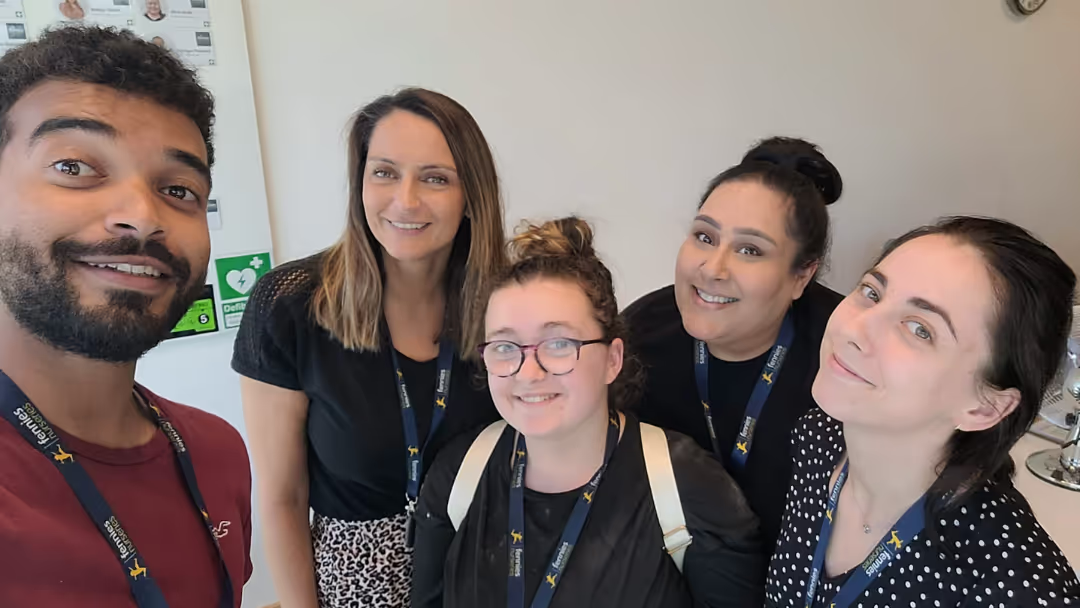
Having a diverse range of educators allows children to develop meaningful relationships with role models who bring different teaching styles and life experiences. Our educators reflect on how being a male educator shapes their interactions with children.
Viktor - Deputy Manager, Fennies Kidbrooke, Whittle Road
"Absolutely, 100%! I find myself to be more encouragement-focused in terms of the development of the children, and I tend to push children more to try something out of their comfort zones, more than my female counterparts would sometimes do. That’s not to say females don’t, but males display this type of mindset more typically. So being able to push the children to try and engage with new things is a great way males can influence the children."
Jake - Nursery Manager, Fennies Bromley, London Lane
"Absolutely! Being an educator gives you direct insight into a child’s development and allows you to take a hands-on approach to supporting them. Children in Early Years are so new to the world, and it’s our role to help shape their minds and equip them with the life-readiness skills they need to succeed. This is such a critical stage of their growth, and the impact we make during these formative years can set the foundation for their future. It’s both a privilege and a responsibility to guide them as they discover the world around them."
Rupert - Room Leader, Fennies Beckenham, Mosaic Way
"As our approach can be slightly different, the children will benefit and grow more holistically as they interact with different styles and approaches. Each employee will have a unique style, working within the EYFS framework guidelines, but it’s beyond beneficial for the children to have different relationships with the team and their key people to best prepare them for life ahead."
Jamie - Head of People, Fennies Nurseries
"It’s not something I consciously think about, I’d say it just happens naturally. While men make up only approximately 4-5% of the Early Years workforce, they’re often overrepresented in panels and discussions, which can create a skewed perception. I don’t believe any voice is more important than another, but having a balance of perspectives is key. That diversity helps children grow up seeing that people of all genders can nurture, teach and support them, giving them a more well-rounded view of the world."
Martin - Room Leader, Fennies Croydon, Addiscombe Road
"Yes I do! It gives me the opportunity to influence and shape young life’s minds from my perspective and using the Birth to 5 years as a guideline. Each person can help children to develop in a different manner and prepare them for school and their life ahead. Being able to have a positive impact in aiding children with their needs and helping them achieve key milestones during their Early Years is what our job revolves around, and there’s nothing I’d rather do!"
Claudio - Head of Diversity and Inclusion at Male Childcare & Teaching Jobs
"Absolutely. Being a male educator gives me the unique opportunity to show children that both men and women can excel in any role, whether that’s nurturing, teaching or leadership. It helps challenge the traditional gender norms they may encounter at home or in the media. I’ve seen first-hand how male educators can build different types of relationships with children, offering varied ways of interacting and problem-solving, which can make a positive impact on their overall development."
Final Thoughts: The Future of Male Educators in Early Years
The presence of male educators in Early Years settings is vital, not just for breaking down gender stereotypes but for creating a richer, more inclusive learning environment for children. By addressing any barriers that exist and promoting representation, it will gradually encourage more men to explore careers in Early Years. Meaning we can build a workforce that truly reflects the diversity of the world we live in.
If you’re considering a career in Early Years education, take inspiration from these stories. Your presence and contribution can make a lasting impact on the lives of young children, shaping the next generation in ways you may never have imagined.
FAQ
Subscribe to our newsletter
Stay up to date with Fennies news





